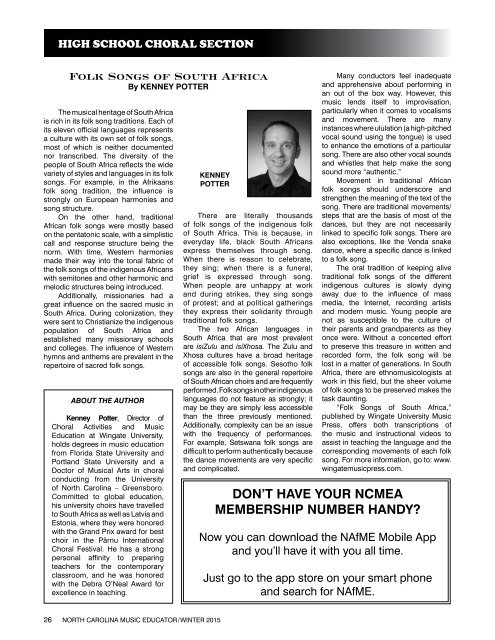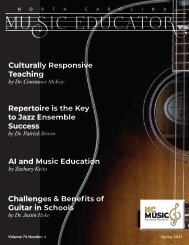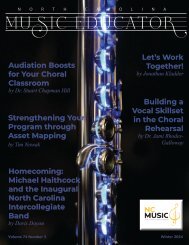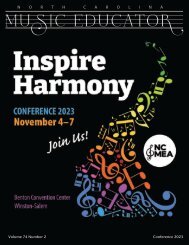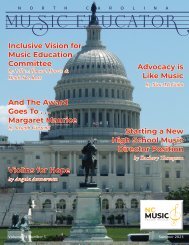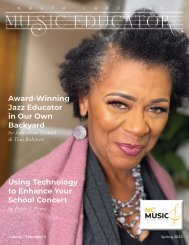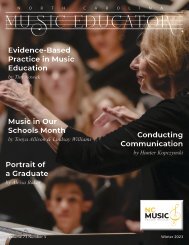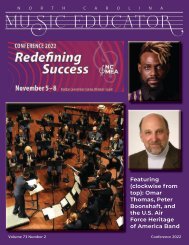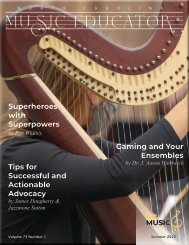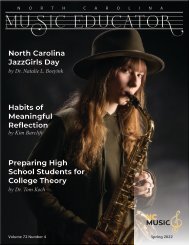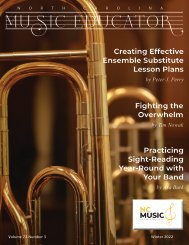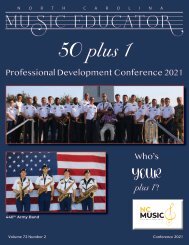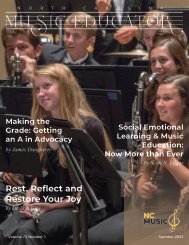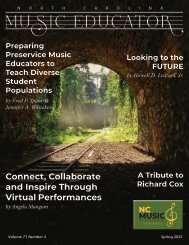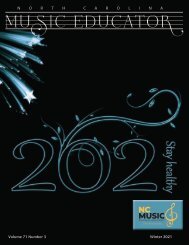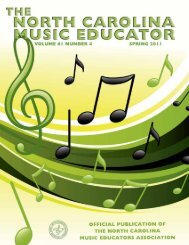NC Music Educator Winter 2015
North Carolina Music Educators Association Journal Winter 2015
North Carolina Music Educators Association Journal Winter 2015
You also want an ePaper? Increase the reach of your titles
YUMPU automatically turns print PDFs into web optimized ePapers that Google loves.
HIGH SCHOOL CHORAL SECTION<br />
Folk Songs of South Africa<br />
By KENNEY POTTER<br />
The musical heritage of South Africa<br />
is rich in its folk song traditions. Each of<br />
its eleven official languages represents<br />
a culture with its own set of folk songs,<br />
most of which is neither documented<br />
nor transcribed. The diversity of the<br />
people of South Africa reflects the wide<br />
variety of styles and languages in its folk<br />
songs. For example, in the Afrikaans<br />
folk song tradition, the influence is<br />
strongly on European harmonies and<br />
song structure.<br />
On the other hand, traditional<br />
African folk songs were mostly based<br />
on the pentatonic scale, with a simplistic<br />
call and response structure being the<br />
norm. With time, Western harmonies<br />
made their way into the tonal fabric of<br />
the folk songs of the indigenous Africans<br />
with semitones and other harmonic and<br />
melodic structures being introduced.<br />
Additionally, missionaries had a<br />
great influence on the sacred music in<br />
South Africa. During colonization, they<br />
were sent to Christianize the indigenous<br />
population of South Africa and<br />
established many missionary schools<br />
and colleges. The influence of Western<br />
hymns and anthems are prevalent in the<br />
repertoire of sacred folk songs.<br />
ABOUT THE AUTHOR<br />
Kenney Potter, Director of<br />
Choral Activities and <strong>Music</strong><br />
Education at Wingate University,<br />
holds degrees in music education<br />
from Florida State University and<br />
Portland State University and a<br />
Doctor of <strong>Music</strong>al Arts in choral<br />
conducting from the University<br />
of North Carolina – Greensboro.<br />
Committed to global education,<br />
his university choirs have travelled<br />
to South Africa as well as Latvia and<br />
Estonia, where they were honored<br />
with the Grand Prix award for best<br />
choir in the Pärnu International<br />
Choral Festival. He has a strong<br />
personal affinity to preparing<br />
teachers for the contemporary<br />
classroom, and he was honored<br />
with the Debra O’Neal Award for<br />
excellence in teaching.<br />
KENNEY<br />
POTTER<br />
There are literally thousands<br />
of folk songs of the indigenous folk<br />
of South Africa. This is because, in<br />
everyday life, black South Africans<br />
express themselves through song.<br />
When there is reason to celebrate,<br />
they sing; when there is a funeral,<br />
grief is expressed through song.<br />
When people are unhappy at work<br />
and during strikes, they sing songs<br />
of protest; and at political gatherings<br />
they express their solidarity through<br />
traditional folk songs.<br />
The two African languages in<br />
South Africa that are most prevalent<br />
are isiZulu and isiXhosa. The Zulu and<br />
Xhosa cultures have a broad heritage<br />
of accessible folk songs. Sesotho folk<br />
songs are also in the general repertoire<br />
of South African choirs and are frequently<br />
performed. Folk songs in other indigenous<br />
languages do not feature as strongly; it<br />
may be they are simply less accessible<br />
than the three previously mentioned.<br />
Additionally, complexity can be an issue<br />
with the frequency of performances.<br />
For example, Setswana folk songs are<br />
difficult to perform authentically because<br />
the dance movements are very specific<br />
and complicated.<br />
Many conductors feel inadequate<br />
and apprehensive about performing in<br />
an out of the box way. However, this<br />
music lends itself to improvisation,<br />
particularly when it comes to vocalisms<br />
and movement. There are many<br />
instances where ululation (a high-pitched<br />
vocal sound using the tongue) is used<br />
to enhance the emotions of a particular<br />
song. There are also other vocal sounds<br />
and whistles that help make the song<br />
sound more “authentic.”<br />
Movement in traditional African<br />
folk songs should underscore and<br />
strengthen the meaning of the text of the<br />
song. There are traditional movements/<br />
steps that are the basis of most of the<br />
dances, but they are not necessarily<br />
linked to specific folk songs. There are<br />
also exceptions, like the Venda snake<br />
dance, where a specific dance is linked<br />
to a folk song.<br />
The oral tradition of keeping alive<br />
traditional folk songs of the different<br />
indigenous cultures is slowly dying<br />
away due to the influence of mass<br />
media, the Internet, recording artists<br />
and modern music. Young people are<br />
not as susceptible to the culture of<br />
their parents and grandparents as they<br />
once were. Without a concerted effort<br />
to preserve this treasure in written and<br />
recorded form, the folk song will be<br />
lost in a matter of generations. In South<br />
Africa, there are ethnomusicologists at<br />
work in this field, but the sheer volume<br />
of folk songs to be preserved makes the<br />
task daunting.<br />
“Folk Songs of South Africa,”<br />
published by Wingate University <strong>Music</strong><br />
Press, offers both transcriptions of<br />
the music and instructional videos to<br />
assist in teaching the language and the<br />
corresponding movements of each folk<br />
song. For more information, go to: www.<br />
wingatemusicpress.com.<br />
DON’T HAVE YOUR <strong>NC</strong>MEA<br />
MEMBERSHIP NUMBER HANDY?<br />
Now you can download the NAfME Mobile App<br />
and you’ll have it with you all time.<br />
Just go to the app store on your smart phone<br />
and search for NAfME.<br />
26 NORTH CAROLINA MUSIC EDUCATOR/WINTER <strong>2015</strong>


